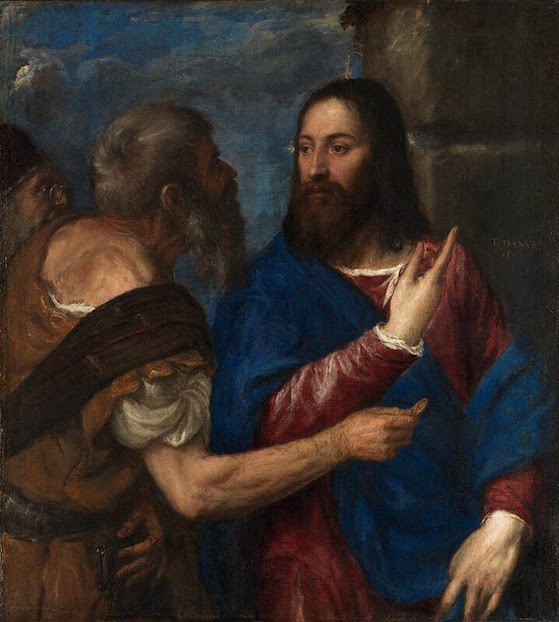Readings (Jerusalem Bible: Australia, England & Wales, Ireland, New Zealand, Pakistan, Scotland)
Readings (New American Bible: Philippines, USA)
Gospel Matthew 22:34-40 (English Standard Version Anglicised, India)
When the
Pharisees heard that he had silenced the Sadducees, they gathered together. And one of them, a lawyer, asked him a
question to test him. “Teacher, which is the great commandment in the Law?” And he said to him, “You shall love the Lord your God with all your heart and with all
your soul and with all your mind. This is the great and first commandment. And a second is like it: You
shall love your neighbour as yourself. On these two commandments depend all the Law and
the Prophets.”
In that homily the late Archbishop of Seoul was bringing together the two Great Commandments that Jesus gives us in today's gospel and between which there is no conflict. In the First Reading, to which the Gospel is linked by theme, God reminds the Hebrew people of how they are to treat those who are poor or different - aliens, widows, orphans. If ever you take your neighbour's cloak in pledge, you shall return it to him before the sun goes down (Exodus 22:26; First Reading), That cloak was what a poor person slept in.
In other words, Jesus is asking us to see each person through his eyes. GK Chesterton in his biography of St Francis of Assisi, if my memory is correct, has a wonderful image of a huge crowd looking up at God on a balcony, rather as in St Peter's Square when the Pope is on the balcony there or at his window for the Sunday Angelus. However, Chesterton didn't see himself among the crowd but with God on the balcony, looking down on the people and seeing them as God sees them.
Cardinal Kim was doing something similar. He was
looking at both the university students and the railway workers through the
eyes of God. Rank means nothing to God as he looks on his children. As Psalm
149 so beautifully expresses it, God takes delight in his people [Grail
translation].
On pages 296-297 the Handbook of the Legion of Mary, nearly all of which was written by its founder the Servant of God Frank Duff, quotes from Chesterton's biography of St Francis. St Francis only saw the image of God multiplied but never monotonous. To him a man was always a man, and did not disappear in a dense crowd any more than in a desert. He honoured all men; that is he not only loved but respected them all. What gave him his extraordinary personal power was this: that from the Pope to the beggar, from the Sultan of Syria in his pavilion to the ragged robbers crawling out of the wood, there was never a man who looked into those brown, burning eyes without being certain that Francis Bernardone was really interested in him, in his inner individual life from the cradle to the grave; that he himself was valued and taken seriously.
This is how members of the Legion of Mary, which is strong in Korea, are told to look upon each person they meet, indeed to see them higher than themselves. Fr Bede McGregor OP, former Spiritual Director of the Concilium, the central body of the Legion of Mary in Dublin, tells how Frank Duff himself lived that. When he was postulator of the cause for the beatification of Frank Duff he interviewed a man who lived in the Morning Star Hostel, run by the Legion of Mary in Dublin for men who are down on their luck. Father Bede explained tp the man that he was seeking testimonies for the Vatican and needed him to swear on the Bible that anything he said concerning Frank was true. He added that the man was an alcoholic and had lived a tragic life. The man agreed and then he said these beautiful words: Frank Duff was the only man who ever looked up to me.
God is constantly blessing the Church and the world
through persons who embody the Gospel in their lives. I know from my friends in
Korea in particular that Cardinal Kim embodied the Two Great Commandments; he
was an embodiment of what each of us is called to be in virtue of our baptism
in the different situations in which we find ourselves.
Cardinal Kim's grave
평화의 기도 The Prayer of St
Francis (in Korean)
이승희 SeungHee Lee Composer
▫서울가톨릭싱어즈 Seoul Catholic Singers ▫
지휘 유근창 Conductor Simon, Geun-Chang Riu ▫
반주 남효주 Pianist Angela, Hyo-Ju Nam ▫
2019. 6. 29 @신천동 성당 SinCheon-Dong Church
Traditional Latin Mass
Feast of the Kingship of Our Lord Jesus Christ
The Complete Mass in Latin and English is here. (Adjust the date at the top of that page to 10-29-2023 if necessary).
Epistle: Colossian 1:12-20. Gospel: John 18:33-37.
,%20WGA.jpg)




,%20WGA.jpg)




